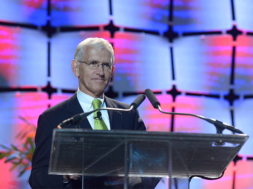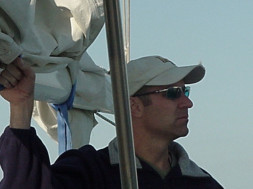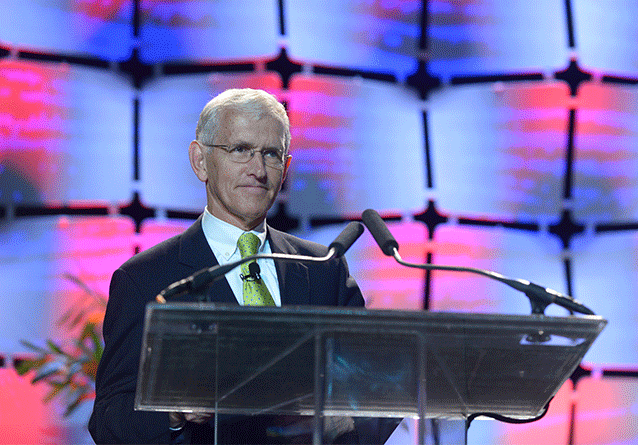
Written from an interview with Steve Gunderson, Retiring President and CEO, Career Education Colleges and Universities
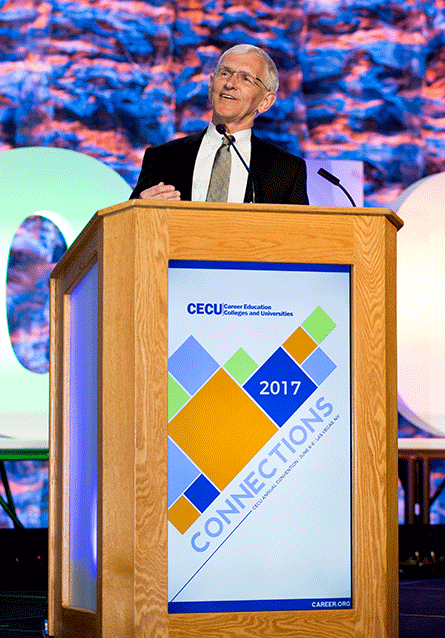 Steve Gunderson said he wasn’t as much retiring as president and CEO of Career Education Colleges and Universities, but rather he is stepping down because it is in the best interest of the sector.
Steve Gunderson said he wasn’t as much retiring as president and CEO of Career Education Colleges and Universities, but rather he is stepping down because it is in the best interest of the sector.
“About 18 months ago, I first told the board … all the polls are suggesting that we could have a Democrat president, we could have a Democrat House and we could have a Democrat Senate,” he said. “If that is the case, (because of) my 16-year career as a Republican member of Congress, combined with my 6 years of pretty aggressively defending this sector against the Obama attacks … I (realized I) may not be the right face and voice that can work with a Democrat administration to get a fair deal for our sector.”
Gunderson said it’s not about him and it’s not about him retiring. “In the interest of the sector, this is the time and place for (the CECU board) to literally consider who is the right person to lead this organization and this sector at this point in time.”
He does plan to travel domestically next year with his husband, hiking and visiting national parks. After a year of traveling, he said he’ll see what is out there for him to do that allows him to be helpful.
Looking back, Gunderson said 2015 was a significant time for the sector when all the big publicly traded schools concluded within a week they were no longer going to be part of the association due to financial reasons. The news came at the June CECU convention.
“I came back home to the office and the first thing I did was call a special meeting of the board for July,” Gunderson said. “The second thing I did was to go to work on what we had to do to save the sector.”
Gunderson recalled telling the board that there were three things they needed to do to save the sector. “The first thing you need to do is change your mission statement,” he said. “You need to focus on post-secondary career education. While most of our members are proprietary, and many are family owned, the reality is we can’t win a fight over the tax status of a school. We have to win a fight about access and opportunities for post-secondary career education in this country.”
Secondly, he recommended to the Board that they change membership so that they are open to any school of any sector — private, public, private nonprofit and private for-profit — that is engaged in post-secondary career education.
And thirdly, he recommended that they change the association’s name.
“At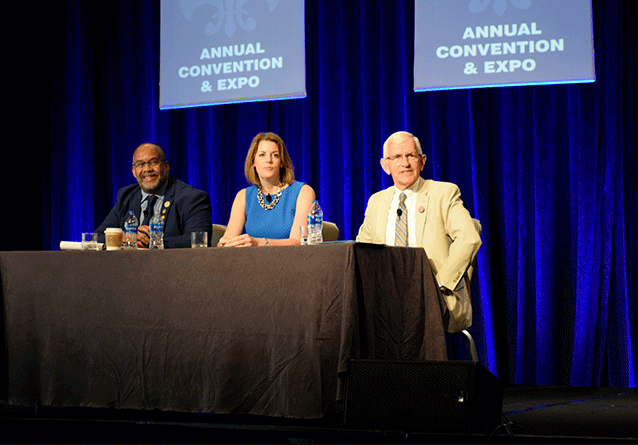 the time we were known as APSCU, and nobody could tell you what the letters stood for and what it meant,” Gunderson said. “So I said change your name in a way that tells people who you are and what you do.”
the time we were known as APSCU, and nobody could tell you what the letters stood for and what it meant,” Gunderson said. “So I said change your name in a way that tells people who you are and what you do.”
After completing a strategic communication study with a number of schools, the organization adopted its current name, Career Education Colleges and Universities, or CECU.
“To the credit of the board, they did those three things,” Gunderson said. “We really made an important and strategic decision that we were going to be about career education.”
And that decision is more important than ever as the sector begins to enter a Democratic administration with 11 million people unemployed, he said. Due to those changes, today they can talk about the importance of this sector and putting people back to work, he said.
Without a doubt, Gunderson said his fondest memories of his time at CECU revolve around graduation ceremonies. “I tell people this is the hardest job I’ve ever had. This makes being in Congress easy. But it’s also the most important job I ever had.”
Standing on stage as those graduates walked across with their caps and gowns to receive their diplomas was heart-warming.
“Many of them were the first person ever in their family to get a post-high school degree,” he said. “Many of them were adult men and women, walking across (the stage) with tears in their eyes because they had done something (no one in) their family had done before. They understood that the skillset and the credentials they now had enabled them to get a real job with real wages and a real chance in America’s middle class. That’s what kept me going all the time…”
But it isn’t easy to convey those stories to Congress or the media, unless you can get representatives of both groups into your schools.
“I don’t think we ever had a bad visit with an elected official,” Gunderson said. “We had a lot of visits where an elected official walked in the door cynical and suspect, and walked out of the door an hour or two later with a totally different view of who we are and what we do.”
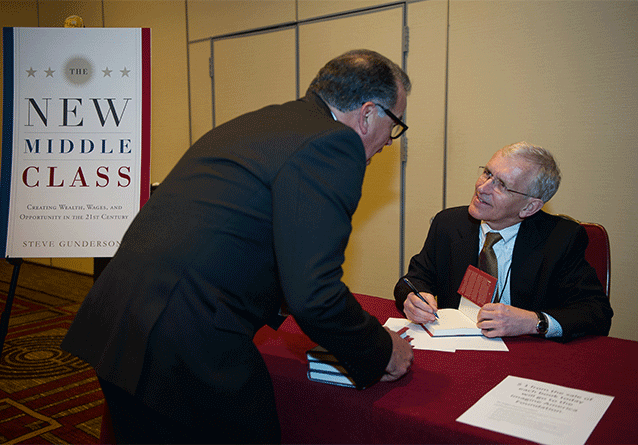
Gunderson said the sector needs to find ways to open up their schools to the policymakers and to the general public. It won’t be easy, particularly in an era of COVID-19 and tightened school security, but it is necessary for those groups to see what they do and how good they are.
They have already reached many other Democrats after spending the last year building a bipartisan outreach, he said.
“The reality is when you go into some of these Democrat districts and you look at the number of schools we have in that district and the number of students, that member of Congress is more interested in serving their constituents than they are in participating in an ideological debate. They will be willing to stand up for us once they understand what we do for their constituents.”
“I think in America’s polarized society, we need to be adults and we need to recognize that there are individuals out there who we can’t reach, and frankly, we shouldn’t waste their time or our time trying to reach them,” said Gunderson regarding the sector’s critics. “Senators Dick Durbin and Elizabeth Warren are good examples of people who are on an ideological mission to destroy the sector and eliminate its very existence. We’re not going to change that.”
CECU’s 5 million campaign, created in 2016 when they anticipated that Hillary Clinton would become the next president and that the sector would be attacked by the administration, was an attempt to figure out how to survive, Gunderson said.
“In some strategy meetings, we recognized that we had to prove to policymakers the important role our sector played in producing skilled workers for the American economy,” he said. So they put together a 10-year campaign committing to producing 5 million career professionals in a decade.
“But if we are to continue the kind of declines we’ve seen over the first four years we won’t make 5 million in 10 years,” he said. “We know that we’ve got a lot less schools and therefore a lot less students than we had annually back even four years ago.” In order to reach that goal, schools need to increase the number of graduates they produce. But there is evidence that is happening, he said.
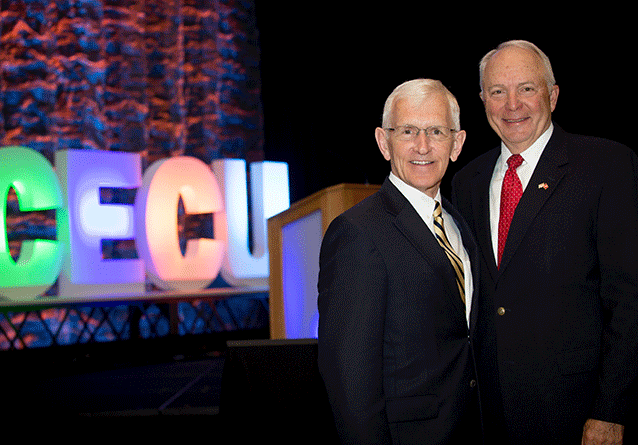
Some schools are seeing a 5% or 6% increase in their number of graduates. “The good news is that we produced 529,000 graduates last year,” Gunderson said. “Many of those are in what are now called essential occupations.” In fact, about 150,000 of the 529,000 graduates are essential workers, he said.
Gunderson said he hopes his legacy will be that people believe he brought a vision regarding the critical emerging role of post-secondary career education to the sector.
“I led this sector through one of its toughest times, through no fault of its own,” he said. “But I think we are better today. We are stronger today than we were nine years ago because we’ve all met the challenge.”
That doesn’t mean he has no regrets.
“No. 1, I really want this sector to be known as the sector of post-secondary career education schools and colleges,” he said. “I don’t want it to be just for-profits. I want more nonprofits. Frankly, I want community colleges that still do career education to join us. I want everybody to join. I want us to be the place where post-secondary career education research, discussion and leadership all happen.”
Secondly, he wished he could have expanded their presence internationally.
“There is growth of mid-level career education all over the world,” he said, “but there are not similar associations like ours around the world. In a global economy with mobility, there needs to be.”
Gunderson said there ought to be the same credentials for health professionals or cybersecurity professionals, or even the trades, no matter where you are located. “I would love it if at some point the economy and the regulatory environment would be such that we would expand beyond the American border,” he said.
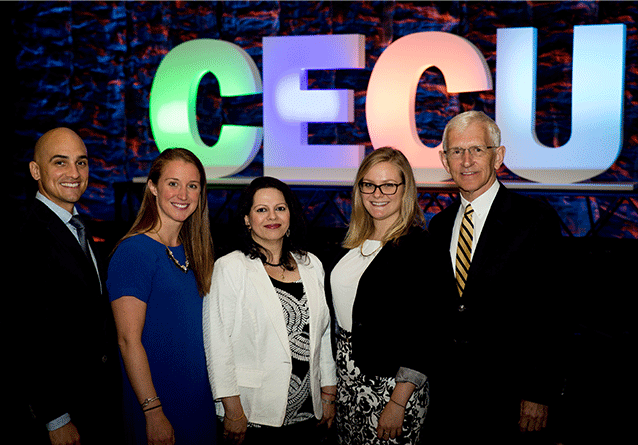 Gunderson said CECU and the sector have been fortunate to have some incredible boards of directors that have made some tough, but important decisions for this sector. He said he hopes that people don’t credit him for CECU’s achievements, but rather the CECU staff.
Gunderson said CECU and the sector have been fortunate to have some incredible boards of directors that have made some tough, but important decisions for this sector. He said he hopes that people don’t credit him for CECU’s achievements, but rather the CECU staff.
“We had the best small team that anybody could imagine,” he said. “It’s a dedicated, skilled and passionate staff that works long hours. If I’ve been successful at all, it’s because I’ve had such a great team. I don’t want to end this chapter without my staff, colleagues and my board getting the credit they deserve.”
As for the future of CECU and the career education sector, Gunderson said he is an eternal optimist.
“I remain an optimist because when you look at the data on the growth projected in many of our occupations, plus the replacement numbers in those occupations, many — if not most of the occupations we teach — are considered high-demand occupations and are in real demand for a new generation of skilled credentialed professionals,” he said. “But I’m also a realist. The Biden administration has to decide if they’re going to see us as a partner in putting America back to work, or if they’re going to see this as an opportunity to continue the ideological war. If they choose the latter, then we need to be aware that we’re going to go through a tumultuous and challenging time and we’re going to have to all unite in ways that enable us to survive and thrive.”
He praised incoming CECU president and CEO Jason Altmire.
“He’s a great guy and he is absolutely passionate and committed to this cause,” Gunderson said. “In many ways as a former Democratic member of Congress, he may be the right person at the right time. I have encouraged him to understand the importance of being positive, the importance of providing the sector a vision and the importance of building relationships with the school leaders, because that’s what CECU needs to do. We need to work with the school leaders in order to get them to participate, believe and to trust us and all those kinds of things.
“He’s going to travel a lot; he’s going to get out and meet the membership, Gunderson said. “I think that’s critically important. I learned so much by visiting schools and getting to know not only the president of that school, but the senior staff, the students and everybody else. That’s how you build credibility, that’s how you build knowledge and that’s how you build relationships.”
CECU recently held its Annual CEO Summit. This year the Summit focused on two issues: What does the election mean, and how do they respond?
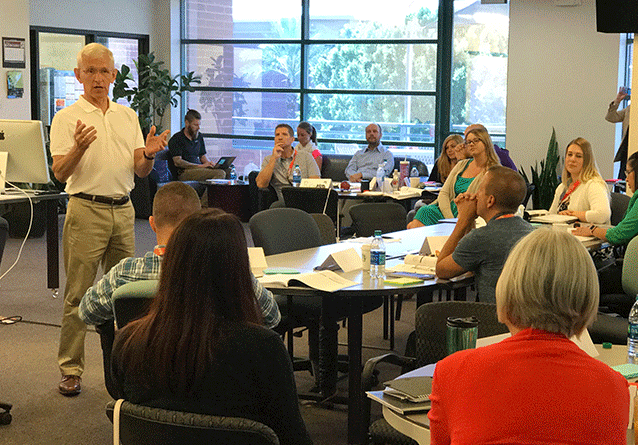 Gunderson said there was consensus that the American public voted for a moderate, middle-of-the-road course in terms of public policy by voting in a Democrat as president with the House and Senate offering a check and balance to the presidency. But he said they know there is an ideological target toward the sector’s very existence, and they need to be prepared for that.
Gunderson said there was consensus that the American public voted for a moderate, middle-of-the-road course in terms of public policy by voting in a Democrat as president with the House and Senate offering a check and balance to the presidency. But he said they know there is an ideological target toward the sector’s very existence, and they need to be prepared for that.
“If you have negative data on my sector, then I know you have old data that was taken during the great recession when everybody opened their doors and gave everyone a chance to succeed academically, regardless of their personal financial and other situations that would impact their ability to succeed,” Gunderson said.
For current data on the sector, Gunderson recommends The Condition of Education 2020, which can be found at https://nces.ed.gov/pubsearch/pubsinfo.asp?pubid=2020144. The 300-plus page report includes a section on higher education including who the students are in each sector, as well as retention and graduation rates, student borrowing data and more.
“It’s really a good place to start,” he said.
Gunderson said the sector is ready to be challenged since it has already changed dramatically for the better. “The bad schools are no longer around,” he said. “Our schools were told to focus on outcomes. They got that message and they’ve done so. Today, we can show graduation rates and placements rates that exceed any other sector in higher education.”
However, CECU also needs to make sure that the metrics are fair and administered in a way that respects a student’s choice of an occupation. “For example, if you are a low-income student and you want to pursue a career in nursing in response to the COVID pandemic, but you understand that initial salaries in many of our public health and nursing professions are not really great, we can’t penalize a student for being low income and going into such an honorable profession,” Gunderson said.
Communication from the bottom will be key as the sector continues to promote the positive impact of its schools.
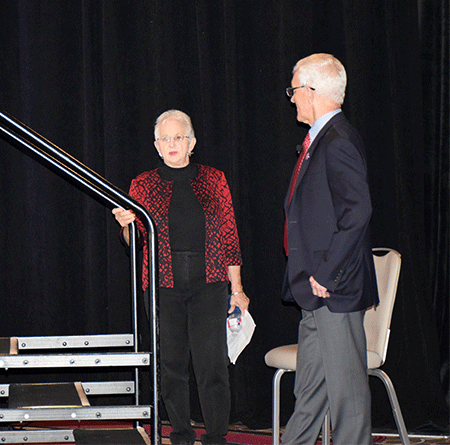 “We are trying to redesign our communications so that there are more communications from the … ground up, from the school and the community up, because that’s what we need to happen,” Gunderson said. “A Washington-based association speaking to members of Congress does not have the power and the impact that a school talking to their member of Congress does.”
“We are trying to redesign our communications so that there are more communications from the … ground up, from the school and the community up, because that’s what we need to happen,” Gunderson said. “A Washington-based association speaking to members of Congress does not have the power and the impact that a school talking to their member of Congress does.”
Schools also need to show their legislators the real-life examples of what their school does and how they changed the lives of their students and help them succeed, he said. But schools also need to communicate with prospective students.
“We’ve seen during the pandemic the emergence of all these essential worker classifications, everything from the Allied Health professionals to the professional truck drivers who are transporting the goods, to law enforcement,” he said. “I think we know the emerging demand in many of these occupations. A good example is respiratory therapists and respiratory technicians. A year ago, that was not even a widely known occupation. Today, it is incredibly important. We have seen that our sector plays a very significant role in providing occupational professionals in the whole respiratory area.”
For those in the sector, he ends with this shout out, “Thank you for who you are and all that you do.”
Gunderson said that line, which he ends most of his letters and speeches with, emerged when he realized how gifted and dedicated all the professionals in the sector were when the industry was being assaulted.
“I’ll never forget when I was going to speak at the Kansas, Missouri State Association meeting, and the organizer of the event said, ‘Can you just come and give people some reason to be optimistic about what they’re doing?’” Gunderson said. “I never forgot that question and that request. It led me to say, ‘I see what you’re doing. I looked at the data and I know what you’re doing. Don’t let the opponents destroy who you are, what you do and what kind of an impact you’re making.’”
Written by Barbara A. Schmitz
